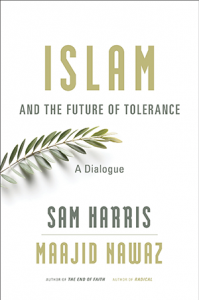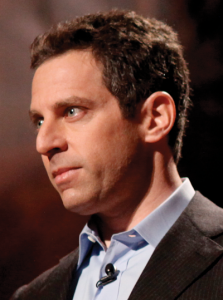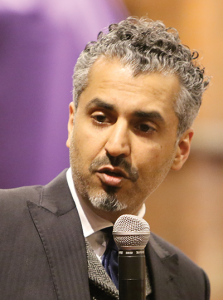Islam and the Future of Tolerance: A Dialogue

BOOK BY SAM HARRIS AND MAAJID NAWAZ
HARVARD UNIVERSITY PRESS, 2015
144 PP.; $17.95 (HARDCOVER), $9.99 (KINDLE)
Sam Harris began his public-intellectual life back in 2004 with the release of his first book, The End of Faith. While ostensibly a criticism of various religions—with special emphasis on Christianity and Islam—the book is, in fact, a cornucopia of loosely gripped ideas on everything from the My Lai massacre to the war on drugs to the correct philosophical understanding of Pyrrhonian skepticism. To those paying attention, then, the strange lagoons Harris has tended to wade in and out of over the past few years have been less surprising.
Nor is anyone, regardless of prior experience, surprised that with blog titles like “In Defense of Profiling,” “Why I’d Rather Not Speak About Torture,” and “We Need to Talk About Islam’s Jihadism Problem,” Harris’s writings are often out-worded by his clarifications and corrections. Thus we have Islam and the Future of Tolerance, his most recent rejoinder, presented in the form of a dialogue with Maajid Nawaz, covering everything from Quranic hermeneutics to the intentions of the state department.

Sam Harris
There’s probably no fundamental semantic distinction between “dialogue” and “discussion,” despite the efforts made by some corporate gurus and human-resource therapists to suggest otherwise. However, perhaps the best way to distinguish the two is to think of a discussion as a confrontation of ideas (not necessarily hostile) and a dialogue as a conversation in which all participants already agree on all the important things and where difference exists strictly in the fine print or, more likely, the style of font.
So it’s only appropriate that Nawaz and Harris agreed to subtitle their book A Dialogue—because they agree on practically everything else.
The most interesting thing about the book isn’t the general lack of disagreement, however, but with what Harris and Nawaz most agree upon. And what the two most agree upon is the political and moral failings of what they refer to as the “regressive Left”—especially its reaction to Islamic extremism. According to Harris: “In the West, there is now a large industry of apology and obfuscation designed, it would seem, to protect Muslims from having to grapple with the kind of facts we’ve been talking about.”
Harris isn’t shy about naming names either. “Whole newspapers and websites can now be counted on to function as de facto organs of Islamist apology—the Guardian, the Nation, Alternet, and so forth.” In an interview on Lawrence O’Donnell’s television show, he went even further, accusing regressive leftists of “denying the link between beliefs and behavior across the board” and “follow[ing] Noam Chomsky off the edge of the world.”
Nawaz has like-words for those who would point laxly to the so-called root causes of ideologically motivated violence: “The grievance narrative that pins the blame on foreign policy is only half the story. It is insufficient as an explanation for radicalization.” Or for those who would withhold scrutiny from cultural or religious minorities, despite whatever reactionary views they might have or indecent actions they might commit, out of a limpid multiculturalism or manufactured bohemianism:
They are culturally deterministic in attempting to freeze their ideal of [Islam] in order to satisfy their orientalist fetish. While they rightly question every aspect of their “own” Western culture in the name of progress, they censure liberal Muslims who attempt to do so with Islam, and they choose to side instead with every regressive reactionary in the name of “cultural authenticity” and anticolonialism.
Everyone by now knows who Nawaz and Harris are talking about. And everyone knows how easy it is to talk down to them.

Maajid Nawaz
To be fair to Nawaz, he seems equally hostile to the old socialist and fellow-travelling Left, blaming them at least partially for the “Muslim tribalism and vacuous literalism” on show today. These were, according to him, “built atop decades of leftist hostility toward America under Arab socialist (Ba’thist) regimes that politically identified with the Soviet Union.”
For those already familiar with the coauthors’ worldviews, Islam and the Future of Tolerance will offer nothing new under the sun. There is Nawaz’s concern for ideological victory in company with a military one (the Islamic State “must be militarily and culturally defeated”). There’s Harris’s favorite debasement, with admittedly a bit more fluffy qualification than usual (“On some occasions the only people making accurate claims about the motivations of Islamists and jihadists are themselves dangerous bigots”). There’s Nawaz’s textual over-indeterminism (“Any given subject has multiple interpretations, which demonstrates that there’s no correct one”). Then there’s Harris’s mimicry of Christopher Hitchens (“I would add that when we did eventually intervene in Bosnia, for purely humanitarian reasons, we didn’t get credit for it”). And so on.
The foundation of Harris’s moral thinking in this book and elsewhere is that intentions are pivotal when it comes to morally evaluating actions and behavior. The surgeon that incises your abdomen is much different than the madman who does. Fair enough. But how far can this in fact get us? Especially when it comes to matters of security, surveillance, and the state—matters Harris repeatedly applies it to.
William F. Buckley used to say that to equate the policies of the Soviet Union with those of the United States was like equating the behavior of a man who pushed an old woman for the excitement of it and a man who pushed her out of the way of an oncoming trolley.
But how many women does the latter get to push before we have a right to be suspicious of his confessed motives? Or what if we found a journal of the man’s that didn’t say anything about protecting women’s lives but mentioned quite a bit about safeguarding their purses? Or if we discovered that the belligerent woman-bullier was also according himself the motive of protecting women from trolleys as well? And how seriously should we take these emotionally obscurantist quotidian analogies anyway?
One of Harris’s most sustained grievances with his detractors is their inability or unwillingness to engage in…well, in what exactly? That’s the million-dollar question. Is it to be a dialogue? Or a discussion? A gentlemen’s disagreement? Or a confrontation of ideas? Harris would clearly prefer the former choices. His critics seem to have (like on most elementary issues) not thought quite that far ahead yet.
